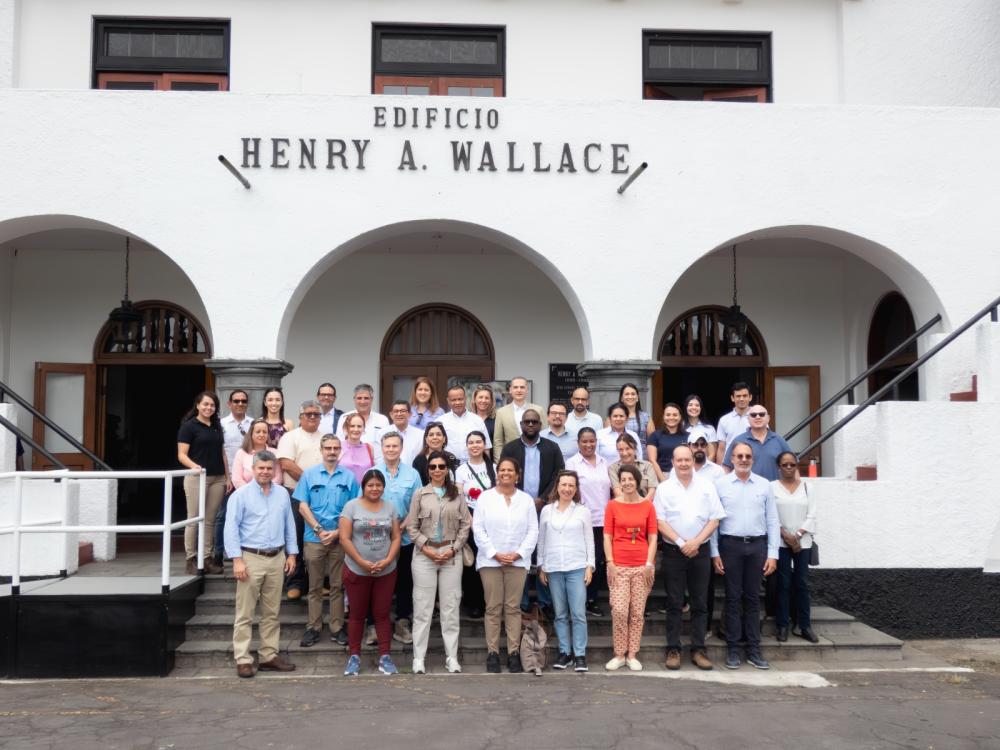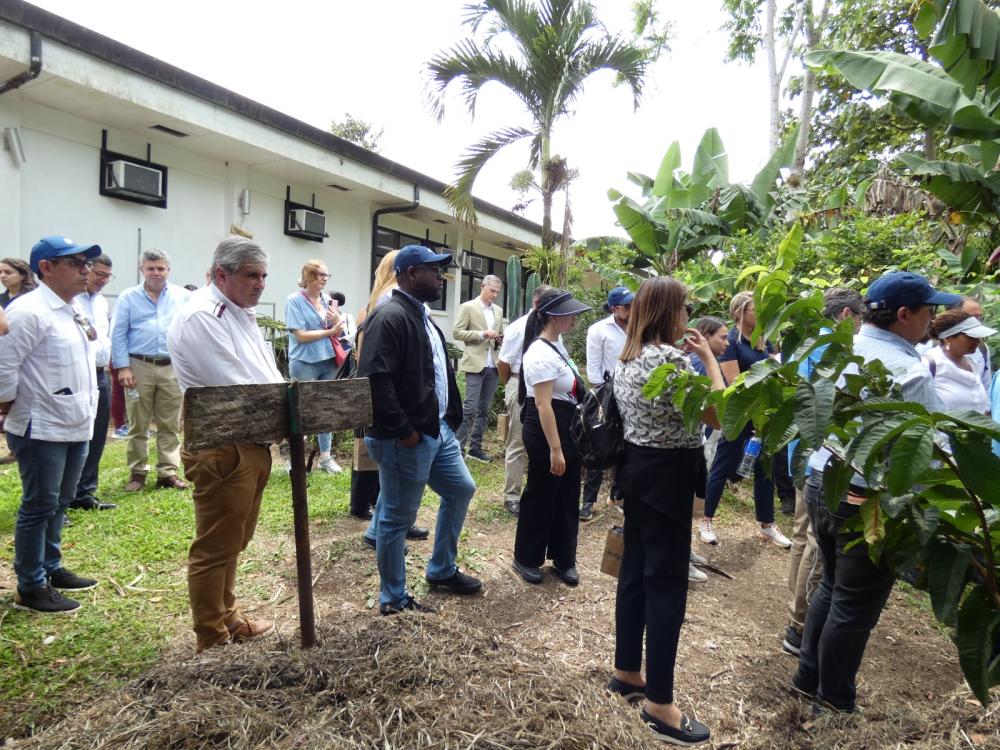Ambassadors to Costa Rica from Latin American and Caribbean countries, European Union’s, Canada and Spain visit IICA and CATIE family farming projects aimed at strengthening rural food and energy security

San José, April 26, 2024 (IICA). Ambassadors and other diplomats from Latin American and Caribbean countries, European Union’s , Canada and Spain stationed in Costa Rica took part in a field trip during which they visited agricultural enterprises that receive technical assistance from the Tropical Agriculture Research and Higher Education Center (CATIE) and the Inter-American Institute for Cooperation on Agriculture (IICA). The assistance is targeted at innovations in food production and rural energy, with a focus on family farming, territorial rootedness, food security, and job creation in rural areas.
The diplomats took part in theoretical and practical sessions on the use of drones in agriculture, particularly by young people in rural areas under the guidance of IICA’s Digital Fabrication and Community Innovation Laboratory (FabLab-LINC).
Taking part in the activity were the ambassadors to Costa Rica of Canada (Elizabeth Williams), Chile (Margarita Portuguez González), Spain (Eva Felicia Martínez Sánchez), Guatemala (Sandra Noriega), Panama (Luis Cabezas) and the Dominican Republic (Josué Antinoe Fiallo).
The ambassadors were accompanied by Jaime Quiroga Carvajal, Chargé d’affaires of Bolivia; Hanna Wajda, Canada’s Trade Counsellor; Glenn Ernie Cuthbert Dixon, Chargé d’affaires of Nicaragua; Eric Ureta, First Secretary of the Embassy of Panama; Eduardo Enrique Urbina, Minister Counsellor of Honduras; Javier Villaseñor Alonso, Director of the Cultural Institute of Mexico; Martha Medina Zorrilla, Chargé d’affaires of Paraguay; Matteo Banti and Nazareth Porras, head and cooperation officer of the European Union’s office in Costa Rica; Juan David Higuera, Second Secretary of the Embassy of Colombia; Patricia Pertejo Alonso, Spain’s Counsellor for Agriculture, Fisheries and Food in Costa Rica; and Aroa Carrillo, also from the Embassy of Spain.
The diplomats learned first-hand about the AGRO-INNOVA project, an IICA-CATIE initiative designed to transfer technologies to smallholders in the Central American Dry Corridor that receives financial assistance from the European Union and works with 21 public and private entities in Guatemala, El Salvador, Honduras, Nicaragua, Costa Rica and Panama.
“The presence of a large delegation of ambassadors here with us today is important, visiting the research and development projects we carry out and learning about the outcomes, as we break new ground and continue to move forward with new research projects that will benefit thousands of farmers,” said Luis Pocasangre, Director General of CATIE.
“CATIE, the great tropical science, research and education institution, and IICA, an inter-American technical cooperation agency with a global reach, complement each other very well. That’s why I’m so grateful for the presence of the ambassadors and the other members of the diplomatic corps because we need to listen to them and we need new ideas for projects to emerge. In the face of more crises, more cooperation and more solidarity is needed, more work with a partner as important as CATIE,” observed Manuel Otero, Director General of IICA.
As well as the AGRO-INNOVA project, the Nueva Turrialba plan was presented. Designed to promote the development of the town in Costa Rica where CATIE is located, it includes agrotourism and agricultural production chains. The plan involves working with the CRUSA Foundation, and supporting the improvement of the production and marketing of Turrialba cheese with denomination of origin.
Another highlight of the activity was the presentation of the Rural Energy project “Capacity building in the use of renewable energies and energy efficiency in rural communities of Bolivia, Colombia, Costa Rica and Guatemala,” financed by the Spanish Agency for International Development Cooperation (AECID) and implemented in Costa Rica in tandem with the BIOMATEC Foundation.
Referring to the Rural Energy project, the Ambassador of Spain to Costa Rica, Eva Martínez, said: “It involves the use of solar panels to bring electricity to communities that have none. This is greatly benefiting agriculture, the extraction of water in places that do not have it, and tourism development. We are also engaged in a project with the European Union to maximize small family plots that are underused. It is an ambitious project involving both crop farming and small animal raising. We are delighted that, thanks to IICA, CATIE, and projects financed by donors such as Spain and the European Union, lives are being changed.”

During the visit, members of the indigenous groups benefitting from this initiative shared their experiences. Florita Martínez, a promoter with the National Commission on Indigenous Affairs (CONAI), explained that: “It’s very hard for members of indigenous peoples to find work, but thanks to this project a lot of tourists visit us, and this has created job opportunities. We share our culture, vision, and traditions, and show them we’re part of the country. The solar panel system also allows us to keep food fresh, and we’re grateful for these projects, because we’re able to say that someone is taking us into account and cares about us.”
“I find the sophistication of the procedures impressive. I think that for countries like ours, which are fighting to achieve food security, we have a lot to share and learn,” remarked José Antinoe Fiallo, the Ambassador of the Dominican Republic to Costa Rica.
“The initiative involving the drones was very interesting, especially seeing how technologies are having such a big impact in rural areas, because you no longer have to check out every last inch of farmland; with drones, things can be greatly improved,” commented Guatemala’s Ambassador to Costa Rica, Sandra Noriega.
The day concluded with a visit to Nortico Cacao Farm, a company involved in cacao and chocolate production, processing and sales, and agrotourism services, which is also partnering with IICA under the Cacao Route Project, financed by the Development Banking System (SBD) of Costa Rica and the UK’s Eden Project.
“The sharing of good practices is a very interesting aspect, we need to work together to adapt to climate change and technological advances, as Nortico has, using drones. These are examples of how initiatives of this kind help people,” said Canada´s Ambassador to Costa Rica, Elizabeth Williams.
“For Chile, IICA has been an important point of reference. Being here, seeing things for ourselves, and listening to other people’s experiences underscores the undoubted quality of the organization. They always keep us informed, they give us input so we can also pinpoint opportunities for collaborative work between this tremendous international organization and each of our countries,” emphasized Margarita Portuguez, Chile’s Ambassador to Costa Rica.
For the Ambassador of Panama to Costa Rica, Luis Cabezas, the work of IICA and CATIE on the ground is very important: “This is what I want us to do, I very much appreciate being invited to come here, my sincere congratulations,” he remarked.
More information:
Institutional Communication Division.
comunicacion.institucional@iica.int